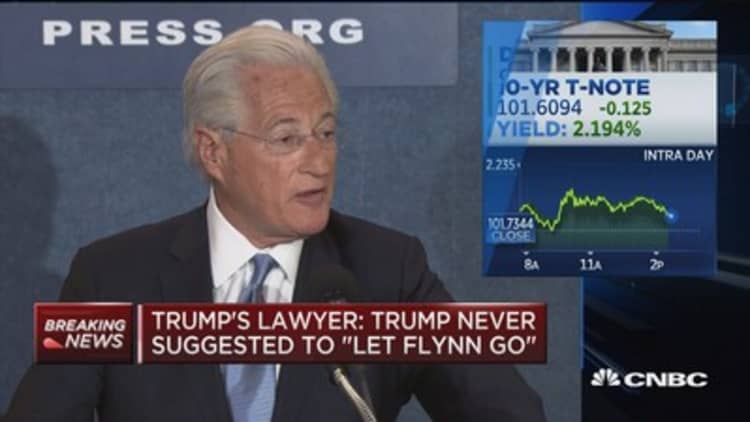
Marc Kasowitz, outside counsel for President Donald Trump, insisted Thursday that the president never said he expected loyalty from former FBI Director James Comey.
Kasowitz also declared that Comey "admitted there is no evidence" of something he has never claimed in the first place — that Russia had succeeded in changing votes in the U.S. election. Trump and his surrogates have repeatedly said there is no evidence that Russia's actions altered the election in his favor.
Kasowitz did not take questions from the press.
More from CNBC:
Comey: I kept records on Trump because I thought he might 'lie'
James Comey admits he was source of news report about explosive talk with Trump
Comey on his talks with Trump: 'Lordy, I hope there are tapes'
Earlier Thursday, the fired FBI director recounted his conversations with the president, including one where Trump said he needs and expects loyalty. Comey told the Senate Intelligence Committee that he had taken memos on those interactions because he was afraid the president might lie about them.
Below are Kasowitz's remarks, unedited as prepared for delivery:
I am Marc Kasowitz, President Trump's personal lawyer.
Contrary to numerous false press accounts leading up to today's hearing, Mr. Comey has now finally confirmed publicly what he repeatedly told the President privately: The President was not under investigation as part of any probe into Russian interference. He also admitted that there is no evidence that a single vote changed as a result of any Russian interference.
Mr Comey's testimony also makes clear that the President never sought to impede the investigation into attempted Russian interference in the 2016 election, and in fact, according to Mr. Comey, the President told Mr. Comey "it would be good to find out" in that investigation if there were "some 'satellite' associates of his who did something wrong." And he did not exclude anyone from that statement.
Consistent with that statement, the President never, in form or substance, directed or suggested that Mr. Comey stop investigating anyone, including suggesting that that Mr. Comey "let Flynn go." As he publicly stated the next day, he did say to Mr. Comey, "General Flynn is a good guy, he has been through a lot," and also "asked how is General Flynn is doing." Admiral Rogers testified that the President never "directed to do anything . . . illegal, immoral, unethical or inappropriate" and never "pressured to do so." Director Coates said the same thing. The President likewise never pressured Mr. Comey.
The President also never told Mr. Comey, "I need loyalty, I expect loyalty" in form or substance. Of course, the Office of the President is entitled to expect loyalty from those who are serving in an administration, and, from before this President took office to this day, it is overwhelmingly clear that there have been and continue to be those in government who are actively attempting to undermine this administration with selective and illegal leaks of classified information and privileged communications. Mr. Comey has now admitted that he is one of these leakers.
Today, Mr. Comey admitted that he unilaterally and surreptitiously made unauthorized disclosures to the press of privileged communications with the President. The leaks of this privileged information began no later than March 2017 when friends of Mr. Comey have stated he disclosed to them the conversations he had with the President during their January 27, 2017 dinner and February 14, 2017 White House meeting. Today, Mr. Comey admitted that he leaked to friends his purported memos of these privileged conversations, one of which he testified was classified. He also testified that immediately after he was terminated he authorized his friends to leak the contents of these memos to the press in order to "prompt the appointment of a special counsel." Although Mr. Comey testified he only leaked the memos in response to a tweet, the public record reveals that the New York Times was quoting from these memos the day before the referenced tweet, which belies Mr. Comey's excuse for this unauthorized disclosure of privileged information and appears to entirely retaliatory. We will leave it the appropriate authorities to determine whether this leaks should be investigated along with all those others being investigated.
In sum, it is now established that the President was not being investigated for colluding with the Russians or attempting to obstruct that investigation. As the Committee pointed out today, these important facts for the country to know are virtually the only facts that have not leaked during the long course of these events.
As he said yesterday, the President feels completely vindicated and is eager to continue moving forward with his agenda with this public cloud removed.
Thank you.


